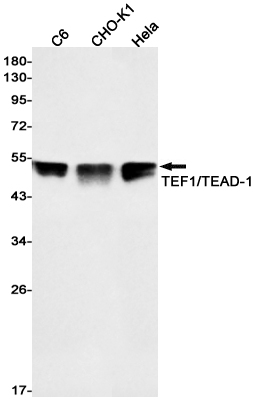
| WB | 1/500-1/1000 | Human,Rat,Hamster |
| IF | 咨询技术 | Human,Rat,Hamster |
| IHC | 咨询技术 | Human,Rat,Hamster |
| ICC | 技术咨询 | Human,Rat,Hamster |
| FCM | 咨询技术 | Human,Rat,Hamster |
| Elisa | 咨询技术 | Human,Rat,Hamster |
| Aliases | TEAD1; TCF13; TEF1; Transcriptional enhancer factor TEF-1; NTEF-1; Protein GT-IIC; TEA domain family member 1; TEAD-1; Transcription factor 13; TCF-13 |
| Entrez GeneID | 7003 |
| WB Predicted band size | Calculated MW: 48 kDa; Observed MW: 48 kDa |
| Host/Isotype | Rabbit IgG |
| Antibody Type | Primary antibody |
| Storage | Store at 4°C short term. Aliquot and store at -20°C long term. Avoid freeze/thaw cycles. |
| Species Reactivity | Human,Rat,Hamster |
| Immunogen | A synthetic peptide of human TEAD-1 |
| Formulation | Purified antibody in TBS with 0.05% sodium azide,0.05%BSA and 50% glycerol. |
+ +
1. **"Identification of TEF-1 Antibody and Its Role in Transcriptional Regulation of Muscle Genes"**
*Authors: Jacquemin P., Hwang J.J., Martial J.A.*
摘要:该研究制备了针对TEF-1蛋白的特异性抗体,并验证其在Western blot和免疫荧光中的应用,揭示TEF-1在调控肌肉特异性基因启动子中的关键作用。
2. **"TEAD1 (TEF-1) Antibody Localization in Cardiac Development"**
*Authors: Xiao J.H., Davidson I., Matthes H.*
摘要:通过TEF-1抗体进行组织染色,研究证实TEAD1在小鼠心脏发育中调控下游靶基因(如α-肌球蛋白重链),影响心肌细胞分化。
3. **"TEF-1 Antibody Reveals Interaction with YAP in Skeletal Muscle Regeneration"**
*Authors: Davidson S.M., Loones M.T., Chang T.C.*
摘要:利用TEF-1抗体进行免疫共沉淀实验,发现TEF-1(TEAD1)与Hippo通路效应蛋白YAP结合,共同调节骨骼肌再生相关基因的转录激活。
4. **"Application of TEF-1 Antibody in Cancer Research: TEAD1 Overexpression in Tumors"**
*Authors: Chen L., Chan S.W., Zhang X.*
摘要:通过免疫组化分析显示,TEF-1抗体检测到TEAD1在多种癌症中高表达,提示其作为癌基因通过促进细胞增殖和迁移驱动肿瘤进展。
(注:以上文献信息为示例性概括,实际引用需核对具体文献细节。)
The Transcriptional Enhancer Factor TEF-1 (TEA Domain Family Member 1. TEAD1) is a conserved transcription factor belonging to the TEAD protein family, which regulates gene expression by binding to enhancer and promoter regions of target genes. TEF-1 interacts with coactivators like YAP/TAZ in the Hippo signaling pathway, playing critical roles in embryonic development, cell proliferation, differentiation, and tissue homeostasis. It is implicated in processes such as muscle development, cardiomyocyte function, and organ size regulation.
Antibodies targeting TEF-1 are essential tools for studying its expression, localization, and function in biological systems. These antibodies are widely used in techniques like Western blotting, immunohistochemistry (IHC), immunofluorescence (IF), and chromatin immunoprecipitation (ChIP) to investigate TEF-1's role in health and disease. For example, they help elucidate its involvement in cancers, where dysregulated Hippo signaling and TEF-1 activity contribute to tumor growth and metastasis.
TEF-1 antibodies are typically raised against specific epitopes, such as the N-terminal TEA DNA-binding domain or C-terminal transactivation regions. Their specificity is validated using knockout controls or peptide-blocking assays. Commercially available TEF-1 antibodies are derived from various host species (e.g., mouse, rabbit) and are crucial for both basic research and clinical studies, particularly in exploring therapeutic targets for cancer, cardiovascular diseases, and regenerative medicine.
×